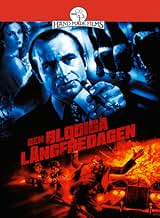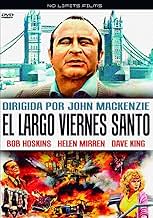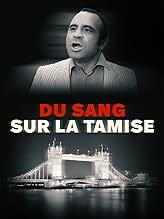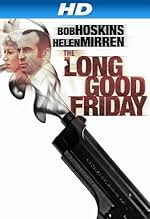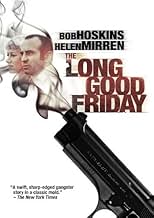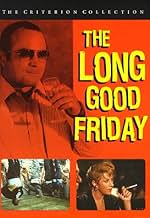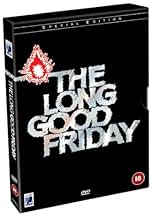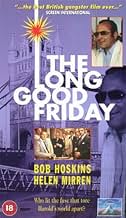Un gangster in ascesa è messo alla prova da una nuova minaccia sconosciuta e molto potente.Un gangster in ascesa è messo alla prova da una nuova minaccia sconosciuta e molto potente.Un gangster in ascesa è messo alla prova da una nuova minaccia sconosciuta e molto potente.
- Regia
- Sceneggiatura
- Star
- Nominato ai 1 BAFTA Award
- 2 vittorie e 2 candidature totali
Recensioni in evidenza
It's the early 1980s, it's Good Friday, and Harold Shand is waiting to entertain some powerful American muscle. He hopes to get them to help fund his dockside development, but someone is murdering his men, and although Harold has a good idea who is responsible, he isn't quite prepared for the events that follow.
Plot wise, The Long Good Friday is a lesson in under taxing the audience, simplicity in structure and forgoing thunder in the name of telling a solid story. The Long Good Friday is a British gangster picture that owes more to the Paul Muni and Edward G Robinson pictures from the golden age than something like "The Godfather". Where the characters are men of the street, working class villains who literally could be living around the corner from us, their respective antics giving them a reputation as infamous stars to be feared - and grudgingly admired.
What many modern day film lovers may not be aware of is that "The Long Good Friday" had its release delayed, held back a year as Margaret Thatcher and her merry men frothed at the mouth due to the film's portrayal of the Irish Rebublican Army. This was at a time when the Irish troubles were reaching new and terrifying heights, and here in this film, the government sensed a fall out that could have sent wrong message shock waves across the British Isles. This is one of the chief reasons that lifts the pic high above many of its contemporaries, it may be a simple story, but it's not merely about two gangs striving for power on one manor!.
Barrie Keeffe's script positively bristles with a hard bastard edge, some of the set pieces play out as true Brirtish greats, once viewed they are not to be forgotten. Some of the dialogue has an air of timeless bravado about it, delivered with cockney brashness from Bob Hoskins' Harold Shand. Hoskins is on fire, seemingly revelling in the role and fusing menace with a genuine sense of earthiness, one moment Harold is the bloke you want to have a pint of beer with, the next he's one step from rage induced retribution. Helen Mirren is fabulous as Harold's wife, Victoria, loyal and unerringly calm in the face of the madness unfolding, while the supporting cast are also highly effective, with a cameo from Pierce Brosnan that is icy cold in making a point.
Perhaps now it feels like it's only of its time, and it may well be that it's only British viewers of a certain age that can readily embrace the all encompassing thread of gangland London at risk from insurgents? But I will be damned should I ever choose to love this film less with each passing year, for to me it only just stops shy of being a British masterpiece, bristling with realism at a troubled time, and cheesing off Margaret Thatcher in the process, hell it works for me, always. 9/10
Plot wise, The Long Good Friday is a lesson in under taxing the audience, simplicity in structure and forgoing thunder in the name of telling a solid story. The Long Good Friday is a British gangster picture that owes more to the Paul Muni and Edward G Robinson pictures from the golden age than something like "The Godfather". Where the characters are men of the street, working class villains who literally could be living around the corner from us, their respective antics giving them a reputation as infamous stars to be feared - and grudgingly admired.
What many modern day film lovers may not be aware of is that "The Long Good Friday" had its release delayed, held back a year as Margaret Thatcher and her merry men frothed at the mouth due to the film's portrayal of the Irish Rebublican Army. This was at a time when the Irish troubles were reaching new and terrifying heights, and here in this film, the government sensed a fall out that could have sent wrong message shock waves across the British Isles. This is one of the chief reasons that lifts the pic high above many of its contemporaries, it may be a simple story, but it's not merely about two gangs striving for power on one manor!.
Barrie Keeffe's script positively bristles with a hard bastard edge, some of the set pieces play out as true Brirtish greats, once viewed they are not to be forgotten. Some of the dialogue has an air of timeless bravado about it, delivered with cockney brashness from Bob Hoskins' Harold Shand. Hoskins is on fire, seemingly revelling in the role and fusing menace with a genuine sense of earthiness, one moment Harold is the bloke you want to have a pint of beer with, the next he's one step from rage induced retribution. Helen Mirren is fabulous as Harold's wife, Victoria, loyal and unerringly calm in the face of the madness unfolding, while the supporting cast are also highly effective, with a cameo from Pierce Brosnan that is icy cold in making a point.
Perhaps now it feels like it's only of its time, and it may well be that it's only British viewers of a certain age that can readily embrace the all encompassing thread of gangland London at risk from insurgents? But I will be damned should I ever choose to love this film less with each passing year, for to me it only just stops shy of being a British masterpiece, bristling with realism at a troubled time, and cheesing off Margaret Thatcher in the process, hell it works for me, always. 9/10
This film opens with several disjointed scenes that leaves the viewer a little breathless and confused: A chauffeur murdered in his car, two men counting cash in a suitcase who are subsequently murdered, a man being knifed in a swimming club and a car bomb exploding outside of a church. We are able to catch up as the story slowly reveals itself but this one does require some viewer participation. While a very intelligent and well scripted film, the action is intense, the body count high and the violence more graphic than is usual for a British film of its era.
The central character in this crime drama is Harold Shand, a highly successful East End gangster who has just returned to London after a business trip to the U.S. Upon his return he finds his mob under attack, several of his employees killed and his organization the target of an unknown foe. Meanwhile he's trying to put together a semi-legit real estate deal, with American Mafia participation. Harold has to keep his American friends from getting nervous with an all out war going on and get to the bottom of whatever has gone wrong while he was away.
Harold is aided in all of this by the classiest moll ever: Victoria. She's beautiful, educated, well-mannered and high class (she brags that she went to school with Princess Anne). Her cool as ice exterior is quit the contrast to the crude thug, Harold, who fancies himself a businessman and hobnobs with politicians and legitimate entrepreneurs but is really only a tough Cockney hood (or 'ood as they say). Victoria tries to handle the Americans while Harold and his mob round up the usual suspects in an attempt to find out where the heat is coming from. Harold is at once a ruthless brute and a lovable and vulnerable little man and by the end of the movie it's easy to find yourself falling for him. He actually has real affection for his crew and treats them as family. This may leave him exposed as, like most movie gangsters, his arrogance and belief in his own invincibility are what will bring him down.
Bob Hoskins, in his first starring role, plays Harold in a performance that conjures up images of other little big men of the silver screen like Edward G. Robinson or James Cagney in some of their great gangster roles. While not as well known as his award winning role in the under appreciated "Mona Lisa", it is the one that put Hoskins on the map. Victoria is played by Helen Mirren and it's hard to take your eye off of her in all of her scenes. Helen was a very good looking girl in her day and was already an established star (having survived her role in "Caligula"). Eddie Constantine, Europe's favorite American, plays the American mafioso and a young Pierce Brosnan, in his first movie, plays an IRA killer.
The plot is a bit complex with a lot of characters to keep track of and the almost incomprehensible Cockney accents and slang are hard to follow (subtitles are helpful for non-Brits). But the story moves along smartly, the direction is very good and the lighting and photography excellent. This film is well done from its start to its memorable conclusion and is highly recommended.
The central character in this crime drama is Harold Shand, a highly successful East End gangster who has just returned to London after a business trip to the U.S. Upon his return he finds his mob under attack, several of his employees killed and his organization the target of an unknown foe. Meanwhile he's trying to put together a semi-legit real estate deal, with American Mafia participation. Harold has to keep his American friends from getting nervous with an all out war going on and get to the bottom of whatever has gone wrong while he was away.
Harold is aided in all of this by the classiest moll ever: Victoria. She's beautiful, educated, well-mannered and high class (she brags that she went to school with Princess Anne). Her cool as ice exterior is quit the contrast to the crude thug, Harold, who fancies himself a businessman and hobnobs with politicians and legitimate entrepreneurs but is really only a tough Cockney hood (or 'ood as they say). Victoria tries to handle the Americans while Harold and his mob round up the usual suspects in an attempt to find out where the heat is coming from. Harold is at once a ruthless brute and a lovable and vulnerable little man and by the end of the movie it's easy to find yourself falling for him. He actually has real affection for his crew and treats them as family. This may leave him exposed as, like most movie gangsters, his arrogance and belief in his own invincibility are what will bring him down.
Bob Hoskins, in his first starring role, plays Harold in a performance that conjures up images of other little big men of the silver screen like Edward G. Robinson or James Cagney in some of their great gangster roles. While not as well known as his award winning role in the under appreciated "Mona Lisa", it is the one that put Hoskins on the map. Victoria is played by Helen Mirren and it's hard to take your eye off of her in all of her scenes. Helen was a very good looking girl in her day and was already an established star (having survived her role in "Caligula"). Eddie Constantine, Europe's favorite American, plays the American mafioso and a young Pierce Brosnan, in his first movie, plays an IRA killer.
The plot is a bit complex with a lot of characters to keep track of and the almost incomprehensible Cockney accents and slang are hard to follow (subtitles are helpful for non-Brits). But the story moves along smartly, the direction is very good and the lighting and photography excellent. This film is well done from its start to its memorable conclusion and is highly recommended.
What can I say? 2 hours of class! This is a film which pretty much tells it how it is. The gangster world is not glamour, it's not a world we should dream about being in.
This film is gritty and realistic, it's one of the best pictures ever to be released from the U.K.
Bob Hoskins is in terrific form here, so damn perfect. Helen Mirren is stunning, great actress and rather eye-catching!!!
Pierce Brosnan is hardly in the picture, he was unknown at the time. There are a few faces which you'll recognise, most of them appeared in famous British Television dramas!
The film setting is gritty and shows the real London underworld in the early Thatcher years.
The direction is confident as is the script, and by the end you'll realise that they had guts! The film score is wonderful, it's always in my head.
This film is class!
This film is gritty and realistic, it's one of the best pictures ever to be released from the U.K.
Bob Hoskins is in terrific form here, so damn perfect. Helen Mirren is stunning, great actress and rather eye-catching!!!
Pierce Brosnan is hardly in the picture, he was unknown at the time. There are a few faces which you'll recognise, most of them appeared in famous British Television dramas!
The film setting is gritty and shows the real London underworld in the early Thatcher years.
The direction is confident as is the script, and by the end you'll realise that they had guts! The film score is wonderful, it's always in my head.
This film is class!
There are so many things to appreciate in this movie. First and foremost, Bob Hoskins and Helen Mirren give outstanding performances as the First Couple of London's underworld. He, with the Cockney-made-good aspirations for status and the "class" he can never attain, epitomizes the hands-on manager overtaken by larger events. She, the cool-headed savvy- tough-and-sexy moll, is almost on top of things enough to redeem the situation but not quite. The key elements of the underworld ruling coalition-- dirty councilor and policeman, lieutenants of varying backgrounds both tough and educated-- make you believe in how this man has achieved peace through strength.
The film's plot is Byzantine whodunit, with gangland-style violence as an accent piece that seems downright tame in the age of "Pulp Fiction". The real hidden star, though, is late-70's London-- oh so run-down and yet full of the potential that drives Harold's ambitions. The views from boating on the Thames are unrecognizable to those who have only seen modern London--- the sole landmarks in common are Tower Bridge and the Savoy hotel. The towers of the City and modern Docklands are just a twinkle in dreamers' eyes.
Overall TLGF is a modern tragedy in the true land-of-Shakespeare tradition, somewhere between Macbeth and Hamlet and King Lear: ambition, betrayal, and the sweep of history interact richly without being heavy-handed in symbolism or over-artiness. This is a satisfying and complex film that invites re-viewing and reflection.
The film's plot is Byzantine whodunit, with gangland-style violence as an accent piece that seems downright tame in the age of "Pulp Fiction". The real hidden star, though, is late-70's London-- oh so run-down and yet full of the potential that drives Harold's ambitions. The views from boating on the Thames are unrecognizable to those who have only seen modern London--- the sole landmarks in common are Tower Bridge and the Savoy hotel. The towers of the City and modern Docklands are just a twinkle in dreamers' eyes.
Overall TLGF is a modern tragedy in the true land-of-Shakespeare tradition, somewhere between Macbeth and Hamlet and King Lear: ambition, betrayal, and the sweep of history interact richly without being heavy-handed in symbolism or over-artiness. This is a satisfying and complex film that invites re-viewing and reflection.
"The Long Good Friday" was given a limited release in the U.S. but fortunately it opened in Los Angeles. Based on a very short synopsis in the L.A. Times, my wife made the 30-mile drive from Pasadena to Santa Monica and were rewarded with the best crime drama I've ever seen. This film is the perfect coming-together of writing, directing and acting to produce a cinematic gem. Nothing overblown and grandiose like "The Godfather" but a tight story that never bogs down, filled with real characters that stand out from the screen. We were introduced to Bob Hoskins and Helen Mirren and both of them have since provided us with some great performances on both large and small screens. I would definitely take this one to the proverbial desert island.
Lo sapevi?
- QuizBob Hoskins' voice was dubbed over by another actor from Wolverhampton out of fear that Americans wouldn't understand his London accent. After Hoskins threatened to sue Jack Gill and British Lion, the dubbing was removed. He was supported by Richard Burton, Sir Alec Guinness, and Warren Beatty.
- BlooperThe last shot of the swimming pool being drained is actually water coming in, but shown in reverse.
- Citazioni
Pool Attendant: They kept it all incognito. They're gonna collect the body in an ice cream van.
Harold: There's a lot of dignity in that, isn't there? Going out like a raspberry ripple.
- Versioni alternativeSome dialogue has been altered on the DVD version presumably for the US audience. "National Service" becomes "Army Service" and in the scene where Harold says they had to carry a wireless about has been changed to carry a bazooka about.
- ConnessioniFeatured in Scrubbers (1982)
I più visti
Accedi per valutare e creare un elenco di titoli salvati per ottenere consigli personalizzati
Dettagli
- Data di uscita
- Paese di origine
- Sito ufficiale
- Lingue
- Celebre anche come
- Venerdì maledetto
- Luoghi delle riprese
- Aziende produttrici
- Vedi altri crediti dell’azienda su IMDbPro
Contribuisci a questa pagina
Suggerisci una modifica o aggiungi i contenuti mancanti

Divario superiore
By what name was Il giorno del venerdì santo (1980) officially released in India in English?
Rispondi


